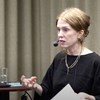reframing
David Ellerman: Reframing the Labor Question
On Marginal Productivity Theory and the Labor Theory of Property. David Ellerman, Visiting scholar at the University of California in Riverside ABSTRACT Neoclassical economics uses the perfectly competit
Three Routes to a Pension Reform. Politics and Institutions in Reforming Pensions in Denmark, Finland and Sweden
By analysing pension reforms in three Nordic countries – Denmark, Finland and Sweden that apply different institutional solutions in their old-age security programmes – the paper argues that the polit

Kirsty Gover: Aboriginality and Alienage: Legal Pluralism at the Australian Border
Research seminar with Kirsty Gover, Professor at Melbourne Law School. Abstract The landmark Australian High Court case of Love-Thoms (2020) raised the possibility of constitutionalised Indigenous-sett
Kirsty Gover: Aboriginality and Alienage: Legal Pluralism at the Australian Border
Place: At the Institute for Futures Studies, Holländargatan 13, Stockholm, or online. Research seminar with Kirsty Gover, Professor at Melbourne Law School. REGISTER AbstractThe landmark Australian High C
Research and ideas for a brighter future
In the wake of the election one can start to wonder what politics should really be about. What are the greatest challenges to our modern society and what can be done to overcome these, with a brighter
Costly punishment in the ultimatum game evokes moral concern, in particular when framed as payoff reduction.
Journal of Experimental Social Psychology, Volume 69, p. 59-64. Abstract The ultimatum game is a common economic experiment in which some participants reject another's unfair offer of how to split some
Symposium on the ethics of economic ordeals: Introduction
Economics and Philosophy 37 Abstract Economic ordeals are allocation mechanisms that impose non-financial ‘deadweight costs to qualify for a transfer’ (Nichols and Zeckhauser 1982: 372). Examples include
Knowing the Game: Motivations and Skills Among Partisan Policy Professionals
"Knowing the Game: Motivations and Skills Among Partisan Policy Professionals", Journal of professions and organizations, Advance Access published September 21, 2016, doi: 10.1093/jpo/jow008 Abstract This
Usability of climate information: Toward a new scientific framework
WIREs Climate Change Abstract Climate science is expected to provide usable information to policy-makers, to support the resolution of climate change. The complex, multiply connected nature of climate c
Knowing the game: motivation and skills among policy professionals
Working Paper 2016 no.1(Published in Journal of Professions and Organization, Vol 4 (1):55-69 (2017). DOI: https://doi.org/10.1093/jpo/jow008) This paper focuses on “policy professionals”, i.e. people whinfluence the course of affairs, while their working-life satisfaction comes from getting their message into the media without becoming personally exposed. The key resource of policy professionals is context-dependent politically useful knowledge, in three main forms: “Problem formulation” involves highlighting and framing social problems and their possible solutions. “Process expertise” consists of understandingthe “where, how and why” of the political and policy-making processes. “Information access” is the skill to be very fast in finding reliable and relevant information. These motivations and skills underpin a particular professionalism based in an “entrepreneurial ethos”, which differs from both the ethos of elected politicians, and that of civil servants, and which has some potentially problematic implications for democratic governance.








